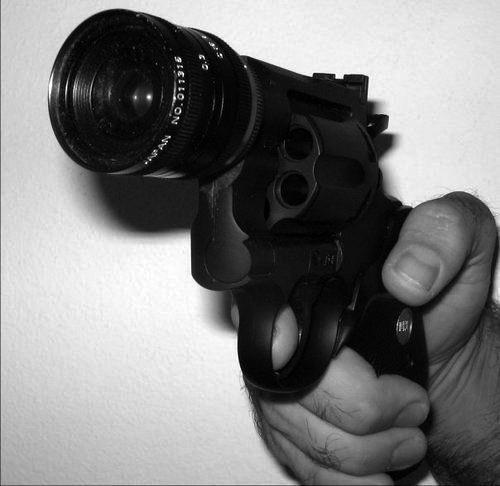A CAMERA IS A GUN


Photographers have examined critical issues before the digital era wielded more control over where their sensitive images appeared. How could any of the photographers like Lotte van Raalte, Alexandra Leese, and Casper Kent have imagined their images one day populating online publications and Instagram feeds? A person who loves guns as my Pops can indeed be beautiful; the feel of gunmetal, smoother than a maiden’s skin; the lovely click of fitted parts; the distinct oil; the lustrous stock; the flawless loading; and, in the final test, the shattering perfection. . . .” Reminds you of a camera right? Jasheed said let’s shoot. Today, keeping subjects apprised of where their faces or bodies will appear is an especially important factor in obtaining consent to take their photograph. Would you agree that a camera, such as the Leicaflex, Nikon, or Canon F1, incorporates much more sophisticated design and precision workmanship (than a gun)? Or is it the same?

“Consent shouldn’t just be one conversation,” said Nina Berman, a photographer, and professor at Columbia University’s School of Journalism.
My Grandfather was a fellow photographer and we recently had the conversation on consent. It was one of those deeply understanding conversations that I am still processing to this day. After I confess to him that I’ll risk my life for the shot, he shared a story about how he almost died from a motorcycle crash. Sitting in the hospital allowed for endless thoughts. Ultimate, he concluded that it really isn’t worth it. Photographers are determined. It’s natural. Yet, the importance of consent within the digital realm is imperative. Obtaining consent from subjects is no longer enough; photographers should make sure they have informed consent. I was wrong. I then obtained new lessons from the mistakes I made.

Posting a photo in a private setting without informed consent is wrong. Photographers aren’t required to have signed release forms at all if they are shooting in public spaces, where there is no expectation of privacy. Re-contextualizing an image as indicative of “all” means possibly sacrificing informed consent. There is no way to see an image of a girl passed out on the bed, which could be harmless or not. Art. Displaying documentary series in a fine-art context gives the space for the artist to assert that the artist is or isn’t making any claims of factual truth, but it ultimately weakens the narrative and their ethical stance. Sharing one’s intentions for the project and keeping up with subjects is crucial.
“As a photographer, artist, journalist, you want to make meaningful work, and you go through sometimes quite a lot of years of doing it to try and get it right, and then you publish it, and then it’s no longer yours.”
Perhaps there is a wild fascination about the pistol that grabs some people. People are getting shot like crazy. However, a camera has vastly more potent power in the hands of a skillful user (or a lucky user) than the most potent weapon. A gun may kill or at best provide a deterrent as protection, but a camera can speak eloquently on almost every subject. If one picture is worth 10,000 words, what can be said of a camera that can turn out 10,000 pictures?
“She tends to tilt landscapes; she cuts off people’s feet or the tops of their heads; she has trouble with the self-timer so that sometimes she doesn’t know she’s taking a picture. Once she put the camera in her purse while the timer was still ticking, and got a perfect picture of the inside of her purse.
So there will be no guns in my house. If my wife ever decided to shoot me, I’m sure she would either hit me in the kneecap or miss me altogether.
You start dying when you stop dreaming.


